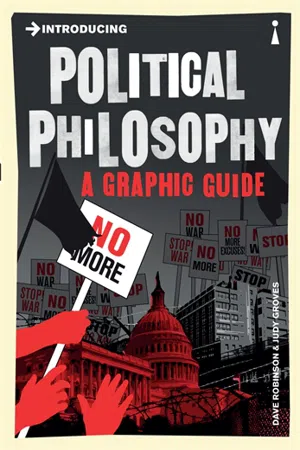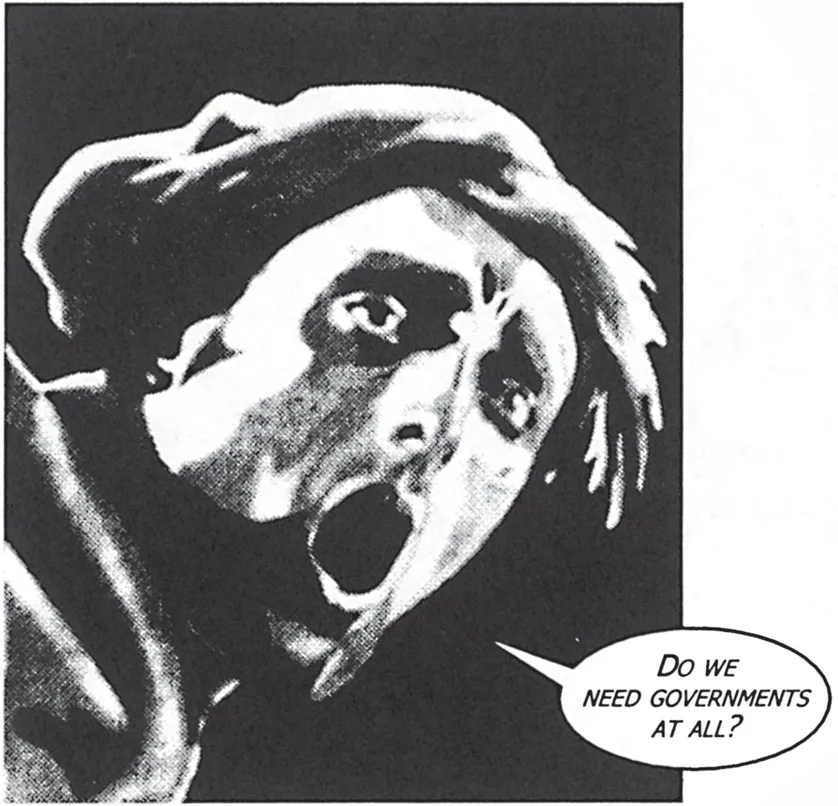![]()
Questions
Political philosophers ask questions about individuals, communities, society, the law, political power, the State, and about how they all relate.
▶ Is it possible or desirable to say what human beings are “really like”?
▶ What is society? Is it something more than the people who live in it? Or was the British Prime Minister Mrs Thatcher right to say “There is no such thing as society”?
▶ What is the State? Is it an artificial construct or something that has naturally evolved?
▶ How free can the State allow individual citizens to be? Are there good moral reasons why citizens are obliged to obey the law? To what extent does the State have the right to punish those who disobey its commands?
▶ Is democracy the best form of government?
▶ Should the State be interested in furthering economic equality? If so, should it be allowed to interfere with other people’s private property?
Back to Basics
Many political philosophers begin by concentrating on individuals. After all, societies and states are made up of individuals first, and governments must come after. Are political institutions simply the end result of attempts to fulfil the essential and universal needs of individuals? But what if we have no real knowledge about the needs and purposes of human beings? Besides, we aren’t just dropped into society with all the ready-made capacities that make us human.
Natural Communities
The word “community” suggests something immediate, local and praiseworthy. Political philosophers think of communities as small groups of people with shared values who enjoy solidarity with little need of laws or hierarchical chains of command.
17th-century political philosophers made distinctions between free associations of individuals – societies, perhaps agreed on by some form of “contract” between individuals – and States, which are constituted by specific hierarchical power structures and the threat of coercion.
Society and State
Is it possible that we are all “social animals” but not necessarily political ones? Where is the evidence for non-political societies? Or is this an idealistic fantasy? Some philosophers believe that distinctions made between societies and States only lead to confusion. Societies can only exist if they are political. Power – and who has it – are features of human life that never go away.
What is Political Philosophy?
Most modern philosophers accept that moral and political propositions have no factual or logical status. Hence, it is impossible to prescribe what States should be or define what ought to be our relationship to them. Providing definitive answers to political problems must be ruled out.
But political philosophy is as ideological as any other kind of discourse. We accept from it what agrees with our normal core beliefs and values. This is why all political concepts are always “essentially contrasted”.
Origins in Ancient Greece
The first people to write about political philosophy were the ancient Greeks. To begin with they were “stateless” semi-nomadic tribes who finally settled all over the coastal regions of the Aegean and Mediterranean.
The “Polis” or City State was usually small and independent, and each one was ruled by its own unique kind of government.
The City State of Athens
The most interesting and influential “Polis” was Athens, which experienced all sorts of governments. Political power had originally rested in the hands of a kind of aristocracy, similar to a tribal council, but gradually the citizen body itself acquired more and more power, and eventually ruled Athens between 461 and 322 BC.
The Duties of Citizens
Being an Athenian “citizen” was a serious business, involving duties as well as rights.
The population was small enough for this kind of “pure” democracy to work, and most Athenians seemed to have been immensely proud of their State. They identified with it so completely that it was virtually impossible for any of them to imagine a life outside it.
Direct Democracy
Athenians fought alongside each other in battle and were more “tribal” than we are now. Their social and political world was very different from ours. They had little conception of “the individual” as something separate from “the citizen” and only very hazy notions of private rights. Society and State were indistinguishable.









